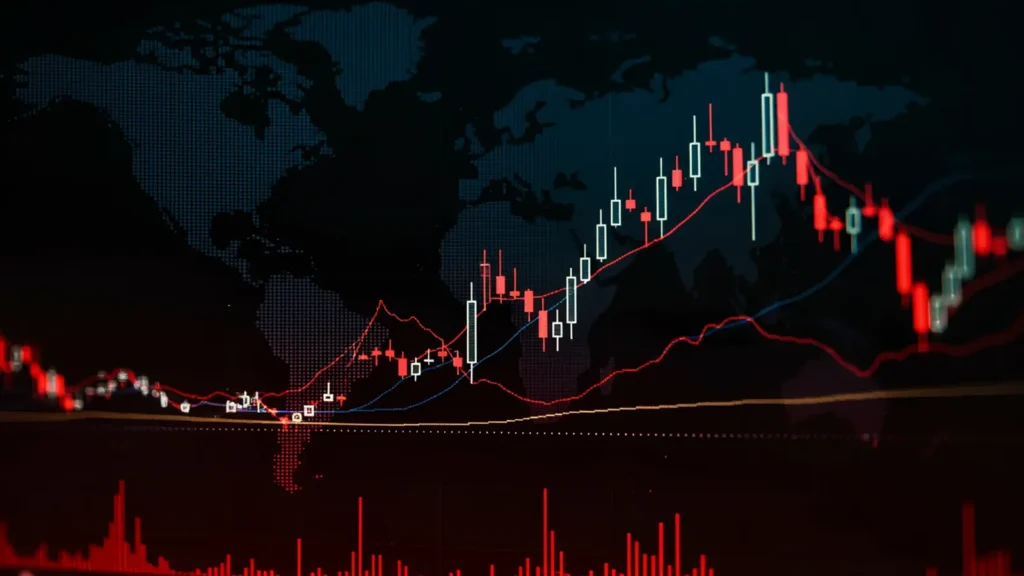The Indian benchmark indices, Nifty 50 and Sensex were highly cautious and volatile today, primarily due to escalating geopolitical tensions in the Middle East and the increasing nervousness ahead of the US Federal Reserve’s policy decision. Though both indices opened slightly higher, both indices gave in to selling pressure the rest of the day, reflecting a clear risk-off tone from investors thus far.
The Nifty 50 opened the day at 24,788.35 points and hit an intraday high of 24,947.55 points before closing much lower, at around 24,801 points. In the same vein, the Sensex opened at 81,314.62, touched an intraday high of 81,858.97, and is now hovering at 81,403.16. This would be a continuation of the lackluster performance seen in the last session when the Sensex fell 212.85 points (0.26%) and the Nifty 50 lost 93.10 points (0.37%).

Geopolitical Storm Clouds and Oil Price Surge
The main catalyst for the market’s wary tone today has been the intensifying war between Iran and Israel, now entering its sixth straight day. More recently, reports of impending Israeli airstrikes against Iran’s Natanz nuclear installation have raised these fears to alarming new levels worldwide. This new geopolitical instability has had immediate effects on commodity markets, with Brent crude rising more than 4% overnight and currently trading at about $74.98 per barrel. Disruption of global supply has caused huge alarm among oil-importing countries, including India—a further aggravator of their inflationary pressures.
Asian markets generally followed suit with the MSCI Asia-Pacific index (ex-Japan) declining, and EURSTOXX 50 futures trading lower. US equity futures were mostly stable after Wall Street fell sharply overnight, crushed by both geopolitical drama and a much worse-than-anticipated read on US retail sales for May, which experienced its biggest drop in four months (down 0.9%).
All the attention is now shifting to the US Federal Reserve’s interest rate decision expected later tonight. Although the market is largely pricing in the Fed to do nothing on rates this time around, especially with inflation having cooled and still remaining above their 2% target, investors will be closely listening to Chair Jerome Powell’s guidance and the “dot plot” for signs of what’s to come. Any hawkish tone from Powell would result in an immediate short-term capital outflow from emerging markets, including India, assuming a dollar strength.
Rupee Weakens, FIIs Continue Mixed Activity
The Indian rupee extended its downward trend, falling for a fourth consecutive session. It let go of 13 paise and opened at 86.37 against the US dollar, for its lowest opening since April 9. This partly reflects a rise in risk aversion overall and the dollar’s safe-haven appeal in the face of global uncertainties.
Domestic Institutional Investors (DIIs) have been net buyers, infusing a robust ₹8,207.19 crore on June 17, showing strong domestic support cutting both ways. Foreign Institutional Investors (FIIs) have been trending, with a net buy of ₹1,482.77 crore on June 17 after five consequent days of net selling. Cumulatively, promoter, private equity, and venture capital selling have exceeded ₹40,000 crore already in June, fuelling worries over lofty valuations.
Sectoral Performance and Notable Stock Movings
Among sectors, the Nifty Auto index and Nifty Private Bank index were among the sectoral indices listed in green, indicating a measure of resilience with 0.2-0.5% trade in the green. Overall market sentiment was muted, with most other sectors experiencing broad-based selling pressure.
The biggest gainers and losers on the stock market include
IndusInd Bank jumped close to 4% after Nomura raised its rating on the bank to ‘buy’ from ‘reduce’ and hiked its price target by more than a third, pointing to superior governance and a more favorable long-term outlook as justification for the upgrade.
DLF posted great sales of $1.3 billion at its luxury housing project in Gurugram, a sign of strong appetite in the premium property market.
Hindustan Zinc was among the top losers after its promoter, Vedanta, was said to have offloaded a 1.7% stake in the company through a block deal.
BSE shares crumbled more than 6% after SEBI approved the National Stock Exchange’s request to move its weekly equity derivatives expiry from Thursday to Tuesday, starting September 1, 2025.
Also check:- Indian Markets Trade Cautiously as Geopolitical Concerns Persist
It continued to catch investors’ fancy after the company announced winning a massive ₹6,447.54 crore order to supply optical fiber cables under BSNL’s BharatNet project.
UGRO Capital stocks on a catapult post the announcement of its buy of Profectus Capital for ₹1,400 crore.
Looking forward and across the world, participants in regional and global markets will be looking to geopolitical developments, particularly in the Middle East, and the expected outcome of the US Fed meeting for more clues. How global events combine with domestic fundamentals will determine the market’s path in the near term.

